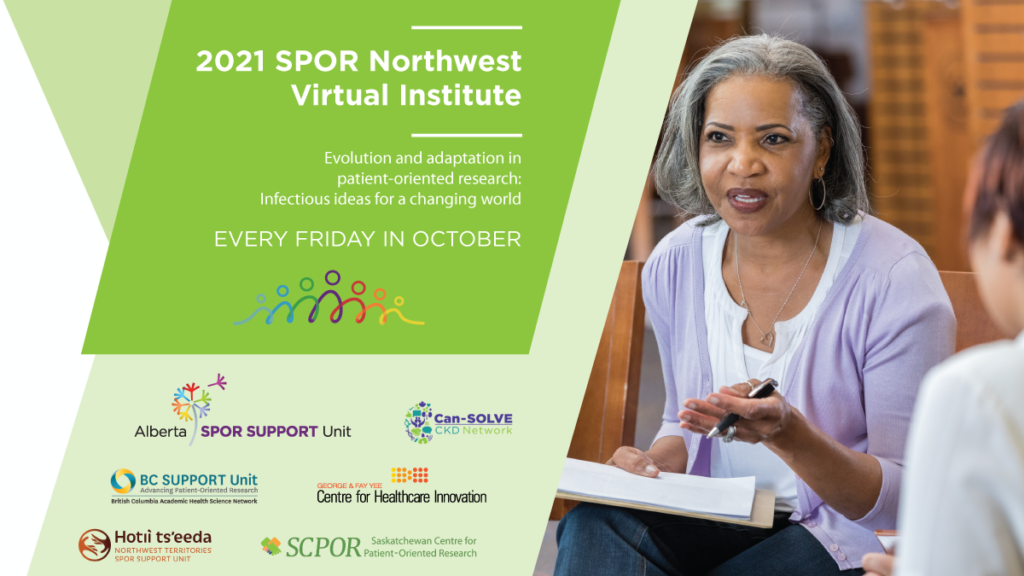The Alberta SPOR SUPPORT Unit’s October Virtual Institute will host northwestern Canada’s top experts to discuss the biggest issues and latest developments in patient-oriented research.

Patient-oriented research is a relatively new approach in the world of health care and medicine.
That’s why the Alberta SPOR SUPPORT Unit (AbSPORU) holds an annual training institute to help students, researchers, clinicians, heath system administrators, patients and others learn more about this emerging research approach. Registration is now open for this year’s event, the SPOR Northwest Virtual Institute, which will take place every Friday in October, featuring patient-oriented research experts from across western and northern Canada.
It is the second time the event is being held virtually and the first time that AbSPORU has partnered with teams in other provinces to expand the range of perspectives presented at this year’s month-long event.
Putting patients first
“Traditionally research projects were developed by clinicians and health researchers based on topics, priorities and methodologies they saw as relevant,” says Kelli Buckreus, MA, associate director of Capacity Development for AbSPORU at the University of Calgary’s Cumming School of Medicine (CSM). The Capacity Development team is led by Buckreus under the direction of CSM professor of medicine, Dr. Sofia Ahmed, MD.
Buckreus explains that while this traditional approach advances health and medical knowledge, it may miss addressing priorities and outcomes that are important to patients.
“Patient-oriented research is about engaging patients, their caregivers, and families as partners, as well as researchers, clinicians, and policy decision-makers in the research process,” she says. “This engagement helps to ensure that studies focus on patient-identified priorities and priorities that are aligned with health system priorities, which can ultimately lead to better health outcomes.”
The pandemic takes training virtual
Each year, AbSPORU holds a training institute to bring together a community of researchers, patients, clinicians, students, policymakers and more, to share insights, connect with colleagues and promote patient-oriented research. Prior to 2020, the event was held in person, alternating between Calgary and Edmonton to ensure access to communities across the province.
“Due to the COVID-19 pandemic, we were forced to take the institute online,” says Buckreus. “And as soon as we did, we opened up a whole new world of possibilities.”
Buckreus says that for last year’s Virtual Institute, their numbers doubled from the year before. People from outside of the province registered, as did people within Alberta who were unable to travel to Edmonton or Calgary to participate in past in-person events.
In addition to attendees, she says her team was also able to secure speakers and abstracts from outside of Alberta, which Buckreus says expanded the range of perspectives presented to attendees in a way they never would have been able to achieve in person.
“I think that’s really important, particularly when you have people in other provinces who are doing things that are really innovative,” says Dr. Nancy Marlett, PhD, an associate professor and director of Community Rehabilitation and Disability Studies at CSM. In her view the virtual institute is the forum for SPOR to be able to bring innovation in patient-oriented research to the forefront. Not just for the province but for the country.
Brian Dompé is a patient partner on a number of patient-oriented research projects related to seniors’ health. He co-presented at the 2019 in-person Institute event, and attended last year’s Virtual Institute. He also joined the working group for planning this year’s event. While he missed the energy of presenting in person, he says he got a lot of value out of the virtual model last year. He was able to take in more talks both live and recorded than he would have been able to in person.
“I think for someone like me, who is new to this area, virtual can also feel a lot less intimidating. It’s a good way to get an introduction to patient-oriented research.”
The future is virtual
Buckreus and her team have built on last year’s success by collaborating with SPOR-funded entities across western Canada and the Northwest Territories to create the SPOR Northwest Virtual Institute.
Taking place every Friday in October SPOR Northwest will bring a wider range of perspectives than what is available in Alberta alone, including more perspectives on patient-oriented research through an Indigenous lens from groups in BC, Saskatchewan and the Northwest Territories.
“Partnering with these other teams not only allows us to broaden the type of training we’re able to provide, but it also allows us to explore a wider range of collaborations, which is a big part of the national SPOR strategy,” Buckreus explains.
“Next year we hope to have even more partners from across Canada. My goal is to be able to eventually call this event the ‘SPOR Canada Virtual Institute’.”
SPOR Northwest is open to anyone interested in patient-oriented research and health topics. Registration is open until September 28, 2021.
For more details and to register, visit https://absporu.ca/capacitydevelopment/por-institute/.



 News + Events
News + Events